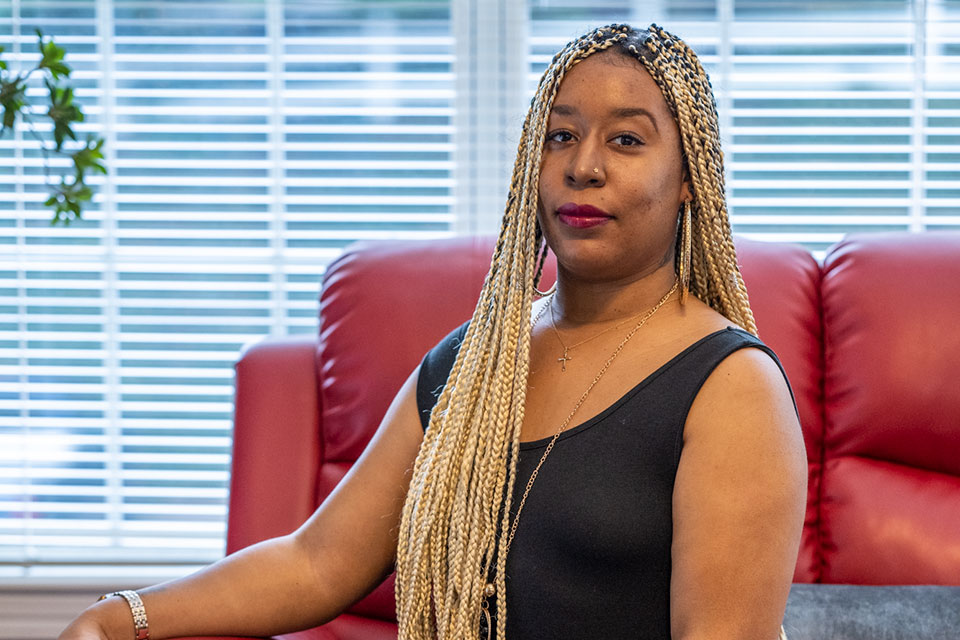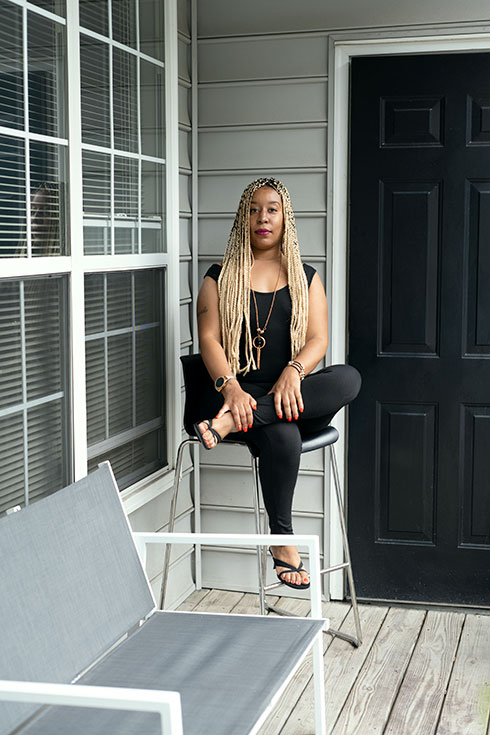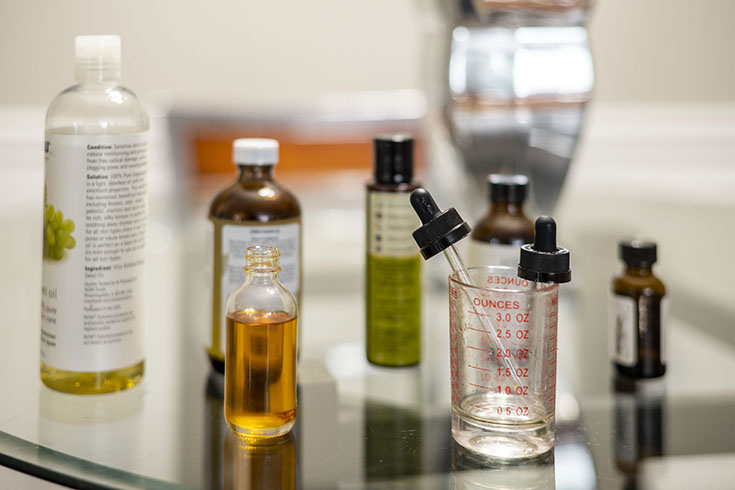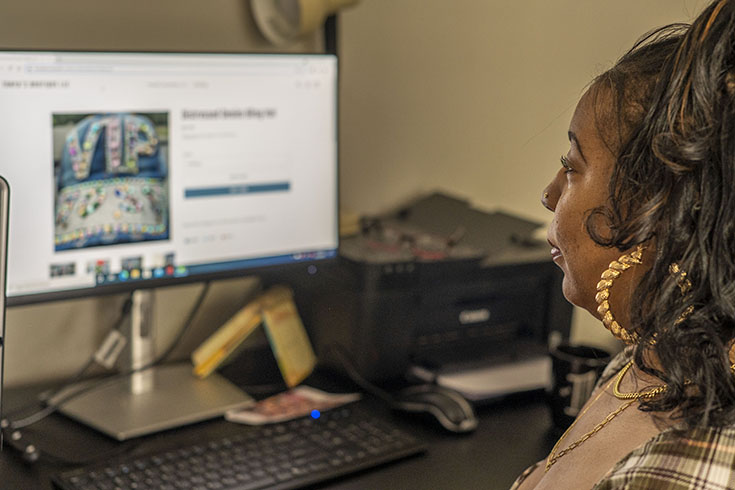Tonya: Swimming against the tide

Tonya is an African American woman in her 40s who lives in the Atlanta area with her teenage daughter. She works part time as a customer service agent, a certified notary public and a tax preparer. She is also an entrepreneur with an online beauty boutique.
Photo Credit: Nydia Blas (all photos)
When she was 5 years old, Tonya's father moved out of the family home in Providence, Rhode Island, leaving Tonya's mother as the sole provider for Tonya and her younger brother.
Tonya's mother worked as an after-school caregiver and a legal secretary before becoming a certified nursing assistant (CNA). Struggling to pay the bills on just one income, she moved with her two young children into subsidized public housing.
Growing up, grandparents, aunts, uncles and cousins were a big part of Tonya’s life. They lived close by and were an important support for Tonya, her mom and her little brother. In contrast to the ever-present money problems in Tonya’s house, many of these family members were secure in their livelihood and finances. At the center of the family were Tonya’s grandparents. Her grandfather was a successful doctor and her grandmother a homemaker who was deeply involved in the local Black church. Every Sunday Tonya’s extended family gathered for dinner at her grandparents’ home.
As a little girl, Tonya dreamed of someday working in medical care like her mother and grandfather, maybe as an emergency medical technician (EMT). She entered school eagerly. Thanks to the financial support and encouragement of her grandfather, Tonya and her brother both attended private elementary schools. Her grandfather wanted to provide his grandchildren with access to better educational resources than those available in the dilapidated and under-resourced public schools attended largely by children of color in Tonya’s low-income neighborhood. The largely white private schools could provide them, he felt, with a good education that would enable them to go on to college and ultimately lead them to professional careers.
 Tonya remembers the private elementary school as “mostly Caucasian. I was one of a few African Americans, and I felt like the oddball. I mean it was good academically, and they gave me a lot of extra academic support which was good but embarrassing. I got pulled out of class for remedial math and reading, which made me feel even more different from the other kids.”
Tonya remembers the private elementary school as “mostly Caucasian. I was one of a few African Americans, and I felt like the oddball. I mean it was good academically, and they gave me a lot of extra academic support which was good but embarrassing. I got pulled out of class for remedial math and reading, which made me feel even more different from the other kids.”
As early as second grade, Tonya became aware that her mother had less money than many of her classmates’ parents. She was increasingly self-conscious about her clothes and appearance and how they were different from her classmates. Desperate to fit in, to appear sophisticated and cool, she started borrowing some of her mom’s clothes and jewelry to wear to school. “A teacher noticed that I wasn’t wearing clothes that fit me right. And I was wearing my mother’s jewelry which probably looked strange. She pulled me aside and asked me about it. She started giving me clothes to wear. She was nice, trying to help, but I felt embarrassed.”
When it came time for middle school, Tonya wanted to be with her friends from the neighborhood, teens of color like herself, and against the wishes of her family she opted to go to the local public school.
Today, in retrospect, Tonya regrets her decision: “Education-wise, the public school was totally different from where I had been before. I got no attention from the teachers or help with the lessons. I thought I could adjust to the difference, but that was just me being silly and immature. I was focused on seeing friends and hanging out with them.”
By the time she entered high school, Tonya had lost interest in her classes. She often just hid out in the basement at home instead of going to school. When Tonya was 17, the principal called her into the office. “He said I wasn’t doing OK in my classes and that I should just drop out. I trusted him to give me, you know, the right decision. I didn’t really know anything better than to just go along with him. He asked me to meet with my mother. We had another meeting, and that’s the day when I absolutely stopped going to school. My mother agreed to have me withdraw. She didn’t know what to do with me, and she trusted the principal too. It was like, if the principal is recommending this, it must be the right thing to do.”
 After withdrawing from school, Tonya felt adrift. Five months later, her grandfather passed away. "My grandpa was always the one who pushed me, to stay in school, finish my GED certificate, take classes... to make something of myself. But shortly after I dropped out, he started getting sick and passed away."
After withdrawing from school, Tonya felt adrift. Five months later, her grandfather passed away. "My grandpa was always the one who pushed me, to stay in school, finish my GED certificate, take classes... to make something of myself. But shortly after I dropped out, he started getting sick and passed away."
A few years later, after a failed relationship with a man and the birth of her son, Tonya moved to Georgia, joining her mother who had moved there a few years earlier. In Georgia, Tonya held many different jobs over the years, as a cashier, a cleaner, a caretaker and a medical transportation worker. She took training courses and worked hard to improve her skills.
Currently Tonya has a part-time job as a customer service representative for which she is getting additional training in order to expand her position. She is a certified tax preparer and a notary public who certifies the authenticity of signatures on official documents. And she is an entrepreneur with a website that that sells accessories, clothing and beauty products, some of which she makes herself. She dreams of her business taking off in the next five years.
 Tonya cobbles together a living and tries to take advantage of available opportunities. She is constantly strategizing on how to improve her circumstances: “I’m always trying make money and make ends meet. I’m super-independent. I always try to have a back-up plan. I try to take advantage of any little opportunity. I have to work at many different things to be able to have a decent income."
Tonya cobbles together a living and tries to take advantage of available opportunities. She is constantly strategizing on how to improve her circumstances: “I’m always trying make money and make ends meet. I’m super-independent. I always try to have a back-up plan. I try to take advantage of any little opportunity. I have to work at many different things to be able to have a decent income."
Still, Tonya makes barely enough to support herself and her teenage daughter and she worries that she does not have savings or assets to cushion her during emergencies. In fact, she went through a period of crisis in 2020 during the height of the COVID-19 pandemic. With her income reduced due to business closures, she found herself turning to local state and church assistance programs for help with electricity and gas bills. Since then, Tonya’s earnings have improved, but her quest for economic security continues. “I don’t know,” she says. "I work hard, but still I feel like I'm always 'swimming against the tide.' "